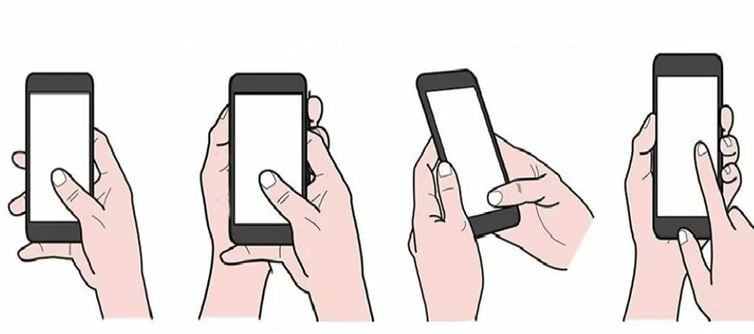
If you’re reading this on your phone, stop. Straighten your back. Lift your chin.
Congratulations — you just saved yourself from another microdose of anxiety.
Because yes, it’s not just your doomscrolling that’s wrecking your peace — it’s the way your neck droops, shoulders cave, and thumbs cling to that glowing rectangle like it’s life support.
How you hold your phone is quietly telling the world what’s going on inside your head — and the science behind it is downright terrifying.
🔥 1️⃣ The Posture-Psychology Connection You Can’t Ignore
It’s called embodied cognition — the idea that your body doesn’t just reflect your emotions; it creates them.
According to chiropractors and psychiatrists, when you slouch, your brain reads it as a signal of defeat.
You literally sit yourself into sadness.
“Collapsed posture reinforces low mood and helplessness,” says Dr. Nitin menon from Apollo Hospitals.
And you thought it was just a stiff neck — turns out, it’s your nervous system whispering, ‘We’re not okay.’
💣 2️⃣ The Mental health Spiral in Disguise
That hunch isn’t harmless.
Hours of staring down at a screen compress your chest, shorten your breath, and trick your body into thinking it’s under threat.
Your phone becomes a stress mirror — you grip it tighter when anxious, check it compulsively when bored, and scroll faster when overwhelmed.
Psychiatrist Dr. Shiv Kataria calls it the “curl of isolation” — a literal folding of the body that mimics loneliness.
When you shrink into your phone, you shrink out of connection.
⚔️ 3️⃣ The Anatomy of Anxiety: What Your Body Is Doing While You Scroll
When your head tilts 45 degrees down to look at your phone, it adds almost 50 pounds of pressure on your neck muscles.
That’s like wearing a small child as a necklace — all day, every day.
Physiotherapist shalini Ananth from Fortis Hospital warns that “forward head posture” doesn’t just cause pain — it alters spinal curvature and weakens the muscles that stabilize your mood-regulating systems.
Translation: your spine is not just hurting; it’s holding trauma.
🧨 4️⃣ Power Poses Aren’t a Myth — They’re a Mental Reset
Remember the “power pose” trend everyone mocked?
Turns out it’s backed by real neuroscience.
When you lift your chin, open your chest, and stand tall, your brain gets the memo: You’re in control.
This activates the parasympathetic nervous system — your body’s “rest-and-digest” mode — which lowers cortisol and boosts calm.
Dr. menon even prescribes “postural resets” — three deep breaths, rolled shoulders, and 30 seconds of sitting upright — to break anxiety spirals.
It’s the cheapest therapy session you’ll ever get.
💀 5️⃣ The Hidden Symbolism of How You Hold Your Phone
Psychologists say your phone posture is a personality mirror.
📱 Tight grip? Anxiety and control.
📱 Constant checking? Fear of missing out or insecurity.
📱 Neck bent deep, lost in screen? Emotional withdrawal.
It’s not just physical — it’s metaphorical. You’re not just bent over your phone; you’re bowing to it.
🧘♀️ 6️⃣ The Fix: Micro-Movements, Macro-Relief
Breaking the slouch habit isn’t about perfection — it’s about awareness.
Here’s how to start:
Raise your screen: Bring it up to eye level. Your neck deserves better.
The 20-20-20 Rule: Every 20 minutes, look 20 feet away for 20 seconds.
Strengthen your posture muscles: Rows, chin tucks, scapular squeezes — your spine’s best friends.
Set reminders: Posture alarms are the new step counters.
Yoga > Scrolling: Stretch what your screen time shrinks.
💫 TAKEAWAY
We spend half our lives bent toward a screen, wondering why our minds feel heavy.
But mental health isn’t just in your head — it’s in your alignment.
The next time you catch yourself slouched and scrolling, remember this:
Every inch your neck bends down adds weight — not just to your spine, but to your spirit.
Straighten up. Breathe deep. Look ahead.
Because fixing your posture might just be the first step to fixing your peace.




 click and follow Indiaherald WhatsApp channel
click and follow Indiaherald WhatsApp channel